I’m going to start with an unpopular opinion: while The Hobbit movie trilogy is a terrible adaptation of the eponymous book, I think it’s actually more faithful to the basic message and setting of Tolkien’s work, especially as set out in the later books, than the Lord of the Rings films. Don’t get me wrong…I believe they’re better films, but ultimately worse Tolkien.
Now that this is out of the way, I feel better and we can get down to particulars.
Fellowship of the Ring starts with that thing all book snobs love best: misappropriated book dialogue. Well, monologue. The beginning of Galadriel’s speech is taken from Treebeard, and adapted. What he actually says is this, TO Galadriel and Celeborn:
‘It is sad that we should meet only thus at the ending. For the world is changing: I feel it in the water, I feel it in the earth, and I smell it in the air. I do not think we shall meet again.’
Now this, see, this makes sense. Treebeard is an ent, intimately connected to nature, and so he can feel the change while it is still happening, through this connection. Galadriel is no ent, but what she has in common with Trebeard is that she’s really freakin’ old. She doesn’t need to ‘feel it in the water’ to know that the world was changed. When she first sailed to Middle-Earth from Valinor, there was a whole huge chunk of land there that is underwater now, and also the world was flat and now it’s round. It’s kind of hard not to notice that the world was changed. I’m sure her intro could have been done without these lines that simply do not belong to her.
‘None now live who remember it‘ feels like a joke at our expense, too, considering it’s Galadriel who is telling us so, and she remembers stuff that’s much further back in the past than just Last Alliance. ‘…race of Men who, above all else, desire power’ is very nice too. I’m sure Galadriel’s brother Finrod, the Friend of Men, would have been really appreciative of that. I bet Barahir sacrificed his life for Finrod precisely because he was so power-hungry. Seriously. And that was just the prologue.

So, now that I’ve followed an unpopular opinion by a careful overdose of concentrated book snobbery, let’s look at what I consider major thematic changes, and never for the better.
First, there are some general things that change the entire tone of the story, of the world, that make Middle-Earth into a completely different place. One of them is the relationship between Men and Elves. The first hint of that appeared in the prologue, and it was not quite an isolated incident. We get another taste of it in a talk between Elrond and Gandalf in Rivendell, where we get a dose of Elrond’s anti-Men racism. Let me just remind everyone that Elrond’s brother chose the fate of Men, and that his grandfather was human, as was his great-grandfather from the other side. Yes, the Half-Elf has some issues when Aragorn falls in love with Arwen, but that’s chiefly for the very understandable reason that Arwen will die if she marries Aragorn. Most fathers would be bothered by that.
His rant about the race of Men failing, and them being weak, all based on the fact that one dude three thousand years ago messed up (in extremely traumatic and difficult circumstances) is very disturbing, doubly so from someone who’s supposed to be a good guy. And look, I remember Tolkien’s racism and talk about ‘highter Men’ as well as anyone, but he never makes as sweeping judgements as Elrond does here. Plus on the contrary, Faramir most of all proves film!Elrond wrong. Tolkien’s men are more liable to evil than elves, yes, but certainly not all considered weak. But apparently ‘men are weak’ is better for drama or whatever.

And it’s not only the racism either. The idea of Elrond summoning everyone for his council has some unfortunate implications as well. In the books, it isn’t serendipity. Everyone who is present at the council has their own, personal reasons to be there. Not only is Elrond calling them not logical – they wouldn’t have had enough time to get there. But who even cares about such details like logic? It’s important for the spirit of Tolkien’s work that he didn’t, too.
The film version is too much like ‘elves rule the world’, a contrast especially painful with the recent scene where Elrond basically gave up any responsibility for it.
Directly tying into this is Galadriel’s monologue to Elrond in The Two Towers. It makes zero sense. “The time of the elves is over,” she says, “do we leave men to their fate?” Well, that’s the point, isn’t it? If it’s over, it means it’s over. The Last Alliance was the end of the age before this one. This war is fought by Men in the south. Mirkwood elves and dwarves have their own battles up north, and that’s it. And it important. It’s very important to the spirit of Tolkien’s world that by the end of the Third Age, the High Elves belong in the past, are departing Middle-Earth and take no direct part in the wars. Galadriel could have probably walked to Barad-Dur and challenged Sauron to a personal duel, but there’s a reason she doesn’t.
Sending a unit of elves to Helm’s Deep makes no sense. And why Helm’s Deep? Why not the Fields of Pelennor? The Black Gate? What’s the logic behind this? It’s just so completely random and nonsensical and undermined the central message that it’s up to Men now. And Hobbits, of course.

The second thing of this nature are the weapons of mass destruction, otherwise known as the army of the dead. Now the army exists in the books too, but its role there is much smaller, and while we don’t see them directly (a point in itself, really), the implication is that they are not any stronger than they were when alive. Aragorn gives them literally one job, employs them for one battle, and then their oath is seen as fulfilled and they are allowed to rest. It’s a similar point as with the elves in Helm’s Deep: the battle of Pelennor itself is won by men. I cannot emphasize enough what an enormous difference this makes.
Is the victory won by sweat, tears and blood, or by magic? Why didn’t everyone just run away to hide until the ghost army killed all the orcs? Why use them to kill the corsairs of Umbar and to fight in Pelennor, and not at the gates of Mordor? Why should it be Pelennor exactly that fulfils their oath, if it wasn’t just one battle?
The victory at Pelennor was cheap, too cheap, and also as it now stands, Men haven’t managed to win a single battle alone. First it was Elves, then ghosts. This is not what Tolkien intended to say. People and their sacrifices matter, but here it just seems that if the Rohirrim never came, nothing much would have changed.

As last of these big general changes, there is the Scourging of the Shire. Or rather, there isn’t, which is precisely the issue. I’m hardly the first to comment on this, and contrary to the previous changes I can at least understand why it was left out – The Return of the King had way too many endings as it was – but it changes everything.
The whole point is that Sauron corrupts everything; that you cannot simply hide and wait for the storm to be over, because for one, no one will do the job for you (no elves or ghosts…sorry to repeat myself), and for another, there would be nowhere to hide. Rivendell and Lórien were only protected because of the rings, and they paid for it by withering after One Ring was destroyed. Apart from that, the war got everywhere.
I know the film doesn’t really have time to mention Mirkwood and Lonely Mountain and so on, and perhaps the whole of Scourging didn’t need to be included, but the Shire simply should not have been the same as when they left. It should not. It runs directly counter to the point Tolkien was trying to make.
So, this is the ways in which I think Jackson misinterpreted the setting as a whole. But we’re not done yet, not by far, because now it’s time for ruined character arcs.
The first of those is Aragorn. Even his introduction is very strange. Probably with the goal of increasing drama, he seems to be acting intentionally suspiciously in Bree. At the same time, he doesn’t look wild enough – in fact, he looks pretty much like an ordinary visitor of that pub.

As a result, it’s less the ingrained xenophobia of the Bree folk/the hobbits and more his actual behavior that makes them wary, a change I don’t like at all. Aragorn isn’t a man who sacrifices his life to the protection of the “little people,” he’s a bit of a jerk.
His jerkiness is evidenced in other situations as well. When we have the first glimpse of creepy Boromir desiring the ring, what is actually much more creepy is that Aragorn’s hand goes to the sword immediately. Just imagine what would have happened had he pulled that sword…or even had Boromir noticed he was about to.
These little signs bloom into a full-blooded problem in The Two Towers, in Aragorn’s treatment of the mysterious White Wizard in Fangorn. Book!Aragorn says, to Gimli’s suggestion of shooting before Saruman puts a spell on them: “We may not shoot an old man so, at unawares and unchallenged, whatever fear or doubt be on us,” and doesn’t reach for his weapon until Gandalf acts seriously suspicious. Film!Aragorn, on the other hand, says “do not let him speak” and prepares to draw his sword. As one fan once put it, “and that’s the difference between the King of Men and a forest bandit.”
The culmination of Aragorn’s Jerk Journey, of course, is the beheading of the Mouth of Sauron. Dude, the guy was just doing his job. No, I’m being sarcastic, but seriously, since when is killing envoys kingly behaviour?

Yes, Mouth is not really a nice guy. But he isn’t the Witch King either, a dangerous opponent in the field. Like I said, he’s an envoy. But he looks horrifying, so I guess it’s OK to kill him?
But this, while damning, isn’t the only change to Aragorn’s character. There’s also him supposedly turning away from the path of kingship, as Elrond says. To be honest, this change baffles me completely. What exactly is not cinematic about a king going to reclaim his throne and gain the hand of the love of his life by doing to? It’s like one of the archetypal stories. Instead, we got a personal story that makes no sense and seems to change twice in every film.
Book!Aragorn is a person with a clear motivation and a goal he consistently works towards for decades, and what we see on page is just the culmination of that journey. That he sees protecting the “little people” and accompanying Frodo on his journey as part of his royal duties, as part of the path towards kingship, is important.
In contrast, the filmmakers seem to regard it as evidence of him “turning away” from that path, because being a king is all about sitting on the throne and having lots of power, I suppose. They seem to put Aragorn’s service and kingship into a false opposition.

Arwen, too, no longer apparently ties into that in any way, which I wouldn’t mind exactly – the implications of that are very problematic – if they did something sensible with that story-line instead. More on that later, but like I said, film!Aragorn just has no clear motivations. At one point he decides to leave Arwen for her own good. It’s interesting because Aragorn in the books is definitely sexist, but in a different way. He pushes her to sacrifice her immortality and stay with him, whereas here he does the opposite. It’s not such a fundamental change to his character, but it’s a dramatic change to his arc and motivation. Apparently he is also worried he will fail the way Isildur did, and that seems to be why he turned away from kingship.
I find that extremely problematic. He’s also an heir of Elendil and Elros and all those other great guys who ruled before it all went wrong. Having some fears and insecurities would be natural I suppose, but…look. Either Gondor “needs no king,” and in that case Faramir should have succeeded Denethor, or it does need a king, and in that case Aragorn is being pretty cowardly here.
In the end, Aragorn seems to have decided to become king because he felt he owed it to Boromir (so what, Boromir thought his brother would suck at the job?), which is kinda nice, I guess, but also absolutely not book!Aragorn’s story-line and like I said, I just don’t understand the change.
Aragorn’s lack of purpose also ties in with his lack of independence. He needs to be told twice that he needs to go through the Paths of the Dead, once by Gandalf, once by Elrond. Actually, that whole meeting of Elrond and Aragorn is nothing short of bizarre. First, sure, Elrond just left Rivendell to its fate to go be condescending to Aragorn. Second, what is that crap about Arwen dying? “Her fate is tied to the ring” sounds like she would die when it’s destroyed. And also, she gave up her grace twice already by now, so why is she dying at the moment? What was the point of giving up her immortality if she was to die immediately without getting to have that child with Aragorn that changed her mind in the first place? It’s a mess.
Like I said, Elrond is the second person to explain to Aragorn he needs to go through the Paths of the Dead, too. Poor boy is just a little dumb. Fortunately he’ll have WMDs, so it won’t matter. And then comes the king of all misappropriated book quotes, Elrond and Aragorn quoting Aragorn’s mother completely out of context and giving her words to Elrond of all people. “I gave hope to the Dunedain, and I kept no hope for myself?” Really? You didn’t give anything to anyone, Elrond, certainly not in the film. Arwen chose this for herself, against your opposition, event though it took her a while.
And Aragorn has even less right to say this than Elrond does, because what is he giving up by becoming king exactly?
All of this brings us to another character who was badly mangled by the films, of course, and that is Arwen. There’s a number of offensive implications to her being made into a Warrior Princess in Fellowship of the Ring, and the fact that it was originally intended that Arwen would take over Éowyn’s role is merely one of them.
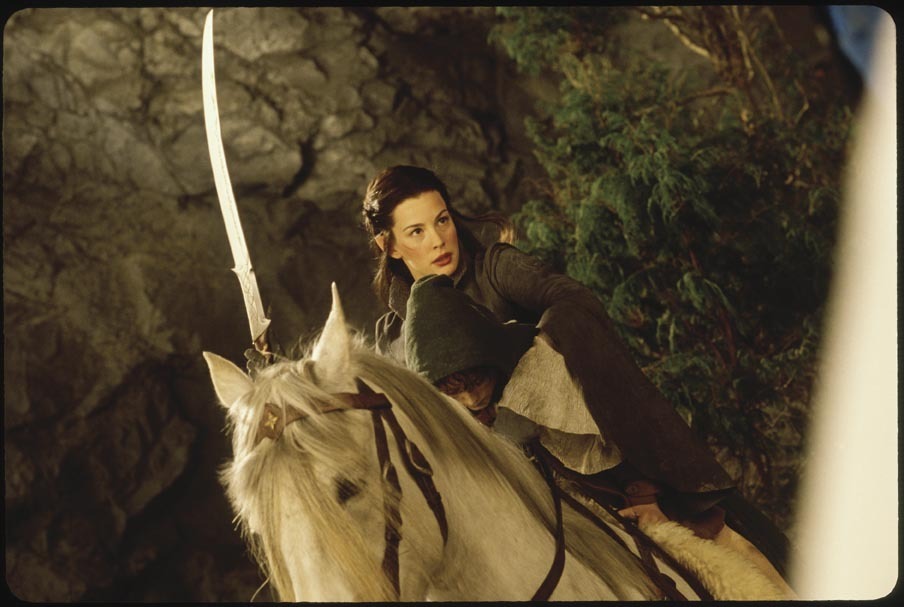
For one, if Arwen can cheerfully be an elven warrior princess and no one minds, why are there no women in the Fellowship? See, in a sexist society, it makes sense. In an equal one, it’s just offensive. It’d be perfectly logical for Aragorn’s girlfriend to go with them instead of Legolas, wouldn’t it? Clearly, magically disappearing patriarchy was a thing in the visual media even at the beginning of this century.
For another, of course, it carries the implication that a woman needs to be a warrior to be worthy, that she needs to be a particular kind of strong, and that women who only do feminine stuff aren’t good enough. I’m sure they had the best, most feminist intention with this, but…no. Especially in light of some of the other changes, like having Arwen promise herself to Aragorn on their first meeting, because who wouldn’t swoon when she saw him, right? Those tragic tales of elven ladies giving up their immortality for Men are bad enough even without them doing so the first time they set eyes on the Man in question.
Keep in mind that Arwen seems pretty firmly decided to stay with Aragorn here, at least. But of course, that’s before he leaves her for her own good.She still seems willing to hold out for him, though, until Elrond mansplains the fate that would await her with Aragorn, and then she is all “I never thought of that! Yeah, you’re right, that’s pretty depressing, I’ll sail West instead.”
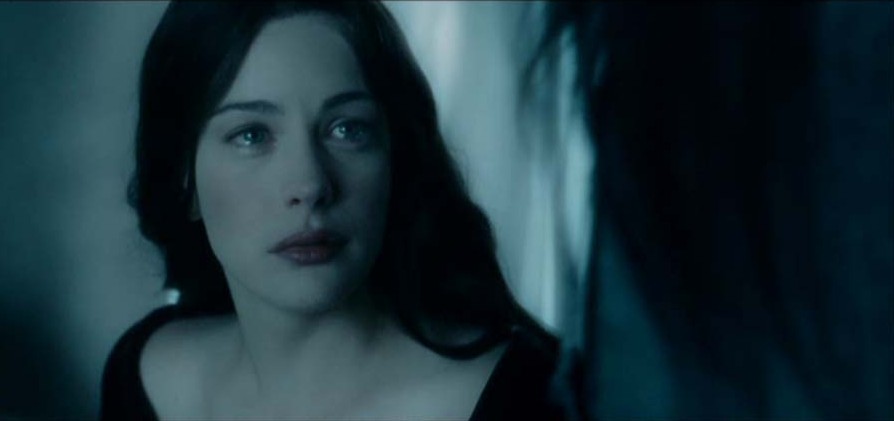
Now Arwen’s quiet faithfulness, her waiting for Aragorn to do what her father told him to do, is her defining characteristic. Take that away, and what remains? She has no consistent characterization. She is a warrior and isn’t, she intends to marry Aragorn and she doesn’t…she and Aragorn are a great match, I guess. Neither of them know what they want.
I don’t get Arwen’s final reason for staying either. Okay, so there’s a possible child in her future. How does that negate Elrond’s predictions? I mean, canonically, he was right. She will die alone and in pain. If she was bothered by this before, and the years with Aragorn were not enough to counterbalance it – if her love for Elrond was stronger – how does a child that doesn’t even exist yet change it? Oh, of course, because Motherhood So Magical. Just give me a break. You know, I have many issues with Tolkien’s depiction of women, but one thing that has to be said for him is that he never, not once, indicates that the primary point of marriage is having children. He always puts the love between the couple front and center.
But that probably wasn’t cool enough for the film, or…I don’t even know. I also find it offensive that this thousands of years old lady would be changing her mind on crucial aspects of her life about as quickly as your average toddler.
The replacement of the standard she made for Aragorn with Andúril ties into this, too. It is not really problematic for the entire story as such – they’re similar symbols – but’s it hugely significant for the role of Arwen. The standard was something she worked on for years, faithful in her devotion to the largely absent Aragorn and believing in his future as king. It was something she did herself, and it was important. The sword was made by someone else, at last minute, and it’s a reconstruction of heritage, there’s nothing of her creativity in it.
Because who even cares about this feminine stuff, amirite?
But of course Arwen, especially in the film version, is not the only woman in Aragorn’s life. There’s also Éowyn. And Éowyn…oh, Éowyn. She is one of the greatest characters Tolkien ever wrote, so of course the film had to ruin her. Just as it gave Arwen a warrior princess scene, it have Éowyn a housewife scene, as she tries to cook for Aragorn. Just, fuck this.

First, why? Tolkien wrote this half a century ago and he didn’t feel any need to have her cook as if it was the only way for her to show her interest. Rather the contrary, she shows her interest by expressing her wish to ride to war with Aragorn. In the film, she makes him stew. Bad stew, too, because everyone knows badass women can’t cook. It’s a rule. And to think we got these scenes instead of Éowyn’s awesome monologue! Because she is robbed off her great response to Aragorn’s patronizing “a time may come for valor without renown. Who then will your people look to in the last defense?” She doesn’t question why this role is assigned to her, instead, she basically says “but I luuuv you! I wanna be with you!”
And he doesn’t exactly reject her out of hand either. While book!Aragorn sees her love and is saddened by it and makes his lack of interest clear as soon as he can, film!Aragorn leads her on, I suppose because he left Arwen for her own good and now is free to play the field. Because as soon as Elrond shows up with his news that Arwen chose not to sail, Aragorn is suddenly clear in his rejection of Éowyn. I guess we should be grateful he isn’t playing them both at the same time?

And then there is the end of Éowyn’s story, which is just downright offensive. After all that time they devoted to her with Aragorn, they seriously couldn’t have spared a few minutes to give her scenes with Faramir in the Houses of Healing justice? But of course, I understand they had to have so many impressive fight scenes they had no time for Éowyn/Faramir romance…oh wait. No. I don’t understand.
That brings us to the other character they ruined completely, Faramir. Even his first scene with Frodo is weird, and a nice example of a nonversation. The writers clearly wanted him to have an impressive, anti-war monologue and didn’t quite know how to tie it up to the script…so they didn’t.

But of course the big issue only comes with Faramir’s decision to take the Ring to Minas Tirith. In the book, he toys with taking Frodo there for a very short moment, but as soon as he realizes what is going on, he changes his mind. “I would not take this thing, if it lay by the highway. Not were Minas Tirith falling in ruin and I alone could save her,” he says about the ring.
A far cry from what happens in the films, where he wants to prove himself to his father by bringing him the Ring. And why? For unnecessary added drama? To convince us there are no pure and selfless people in the world? Just to mess with book fans? I hate this change so much.
And then, what exactly made Faramir change his mind? Seeing that Frodo is controlled by the ring? He knew it can control the weak already, and he doesn’t really know enough about Frodo to know he wasn’t one of those. Was it hearing that Boromir tried to take it from Frodo? But isn’t that exactly what he himself was doing? Why should that shock him? That was what Denethor told Boromir to do. It just seems that ‘randomly changing their mind on crucial things’ is a theme in this film trilogy.
Less depressing, but still irritating are the changes to Denethor. First and foremost, it’s meant to be Faramir who is more like his father in character, not Boromir. That is part of the cruel irony. This includes how it’s Boromir who resents the Stewards not being kings, and Denethor taking pride in the fact that in Gondor, one doesn’t just usurp the throne. That doesn’t mean he’d gladly give the throne to Aragorn, but Gandalf’s commentary about Denethor wishing he was king is unwarranted and oversimplifies the situation.

There’s also the strange moment of Denethor refusing to summon Rohan for help. While I love the lighting of the beacons scene, I don’t like the assassination of Denethor’s character that goes along with it. It makes zero sense. Denethor might believe they stand little chance, but had he been this far gone, Gondor would have fallen a long time ago. He was still organizing defense. This is just silly.
Speaking of rulers, there is Théoden. The biggest problem with him was Saruman’s possession of him. If he was being controlled directly, why even have Grima there? Why does it have to be reduced to a flashy magic fight? Théoden poisoned by Grima’s words is a much more powerful image than Théoden simply controlled by magic. There is a parallel between Denethor indirectly controlled by Sauron and Théoden by Saruman, too, and this completely ruins it.
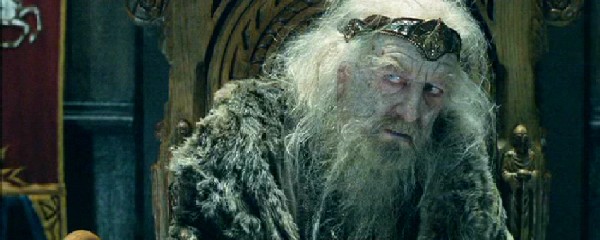
Another, and rather strange, change to Théoden is how everyone tends to treat him like he is stupid even when he makes very reasonable choices. Not wanting to meet Saruman’s stronger army in open field is treated as folly and cowardice, and in Helm’s Deep, Aragorn acts irritated with him and advises him to send for aid just after he says that an army of ten thousand uruk-hai would be there by nightfall. Does he have a teleporter at hand, or…?
Since I mentioned Saruman’s possession, there was a very similar scene in the Fellowship, too. Namely, Saruman’s and Gandalf’s fight, to which the Théoden scene is directly contracted to show the changes in Gandalf’s power. Look, I get it, it’s hard to adapt Tolkien’s vague mentions of magic…but this is not the way to do it. There’s a good reason we only have Gandalf report on this in the book.
Related to the provenance of Saruman are the ents, a race that got completely mangled. Words cannot express how angry I am about the change to their decision. I mean, it directly turns it on its head, being the exact opposite of the books. The ents who never decide impulsively and always consider everything very carefully…decide impulsively directly against their previous considered decision. Because, sure, they would be so upset to see the destruction around Isengard.
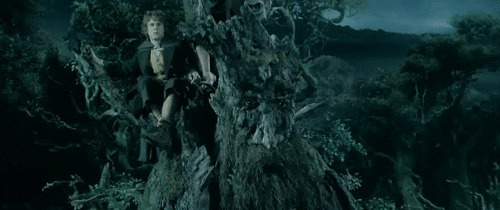
I mean, Treebeard remembers First Age. He saw an entire continent disappear, and the majority of the Great Forest west of the Misty Mountains, too. But of course it would be this little bit of tree-cutting Saruman did that would have him go against everything he believes in.
The last character I want to comment on is Frodo. He fared better than most others mentioned here, but what bothers me a lot is that instead of being in his 50s and a little fat, he looks about 20 and as spry as anyone. A change that had a bearing on his character, especially in the Fellowship but also later, and which also went the way of a more conventional idea of what a hero is supposed to look like, which I consider a great pity.
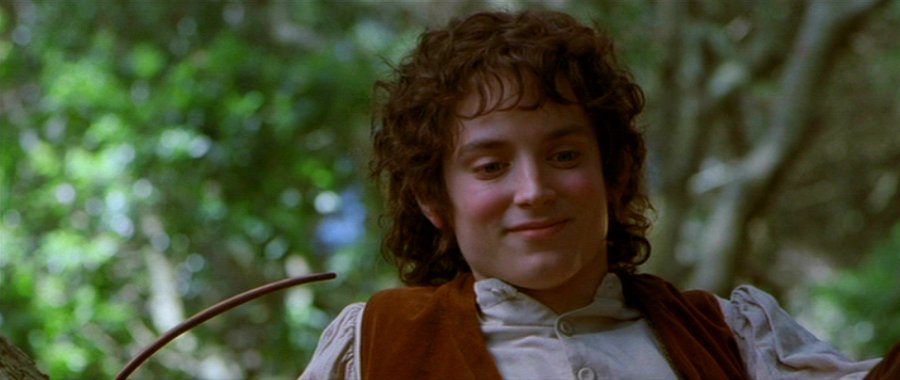
I also don’t like how the choice to accompany Frodo is basically taken away from all of his Hobbit companions, who sort of randomly happen to become part of the adventure. They do have their moment of choice in Rivendell, but it’s not like it was just beyond the corner from the Shire. They went through quite a lot before that.
These, then, are the main issues. I could add any number of nitpicks to this, like all the unnecessarily added drama, but this article would become way too long then, so in closing, I’ll just mention two points that are really not important for the universe at all, but feel like such random slaps in the face to the book fans. The first is Elrond telling Frodo that elves have lived in Imladris for three thousand years when it’s been almost five thousand, and the second is Gandalf saying that he has walked the earth for three hundred human lives when it’s been about three thousand years, or sixty thousand, if you count his time as a Maia. Either way, unless he’s talking about some extremely short-lived – or long-lived – men, it doesn’t work. It’s just these random things that show a mystifying lack of care. It’s not like it’s so hard to check the appendices.
What we have here are a few rather fundamental changes to the universe and several mangled characters, and very often there is no discernible reason for these changes. There are, of course, numerous other changes tot he books, but I either didn’t mind them – like the omission of Tom Bombadil, because the idea of Jackson trying to adapt that gives me nightmares – or I didn’t find them significant enough to comment on. I think what I outlined here is damning enough.
I was surprised myself to see how many similar problems to GoT can be encountered here, to be honest. It’s not quite making almost every storyline its thematic opposite, but I would go as far as to say that the character assassination of Aragorn, Faramir or Arwen are almost on par with Ellaria, The Waif, or Jaime, and the ents did, in fact, get a thematically opposite depiction. So with this in mind, I still stand by my statement that at least The Hobbit never did anything this dramatic, even though the earth-eating worms were mind-shatteringly stupid.
Images courtesy of New Line Cinema

